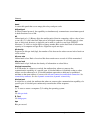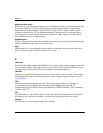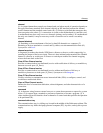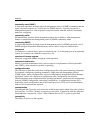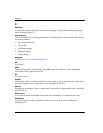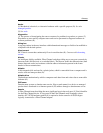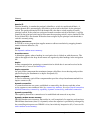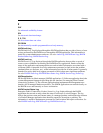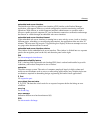
Glossary–14 edge switch 2/16 service manual
Glossary
domain ID
Domain identifier. A number that uniquely identifies a switch in a multiswitch fabric. A
distinct domain ID is automatically allocated to each switch in the fabric by the principal
switch. The preferred domain ID is the domain ID value that a switch requests from the
principal switch. If the value has not been allocated to another switch in the fabric, it will be
granted by the principal switch and will become the requesting switch’s active domain ID. The
active domain ID is the domain ID that has been assigned by the principal switch and that a
switch is currently using.
domain name server
In TCP/IP, a server program that supplies name-to-address translation by mapping domain
name to internet addresses. (D)
DRAM
See dynamic random access memory.
drop-down menu
A menu that appears when a heading in a navigation bar is clicked on with the mouse. The
objects that appear in the drop-down menus are organize by their headings in the navigation
bar.
duplex
In data communication, pertaining to transmission in which data is sent and received at the
same time (D). Contrast with half duplex.
duplex connector
An optical fiber component that terminates jumper cable fibers in one housing and provides
physical keying for attachment to a duplex receptacle (D).
duplex receptacle
A fixed or stationary optical fiber component that provides a keyed attachment method for a
duplex connector (D).
dynamic connection
A connection between two ports, established or removed by the directors and that, when
active, appears as one continuous link. See connectivity attribute. See also allowed connection;
blocked connection; connectivity capability; dynamic connectivity; unblocked connection.
dynamic connectivity
The capability that allows connections to be established and removed at any time.
dynamic random access memory
DRAM. Random access memory that resides in a cell comprised of a capacitor and transistor.
DRAM data deteriorates (that is, is dynamic) unless the capacitor is periodically recharged by
the controlling microprocessor. DRAM is slow, but relatively inexpensive (D). Contrast with
static random access memory.



